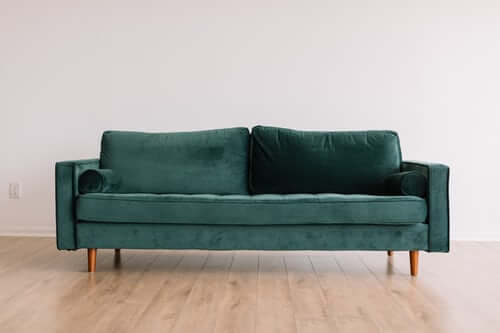
Everything You Need to Know About Choosing Couch Fabrics
Discover the different couch fabric types
Your sofa, or couch, is often the main piece of furniture in a room. Which means it's important to get the right look for your space. But it's not just the appearance of the upholstery fabric you need to consider - it also needs to have the perfect feel. You might love curling up on a soft, snug sofa or need a durable fabric that's robust enough to withstand young children or pets. Which is why choosing between the couch fabric types can be tricky. Not sure which couch upholstery fabric is for you?
If you're looking to buy or upholster a sofa you need to know about the functions and care requirements of different couch fabric types and how to choose the right one.

In this post we'll outline the different types of upholstery fabric used to cover sofas, and look at the difference between natural fabrics and synthetic fabrics.
Different couch fabric types
Upholstery fabrics for couches come in a wide range of appearances and textures. Whether you're upholstering your own couch or buying something already made, it's good to get clued up on the various couch upholstery fabric types once you've decided on the size and shape of the couch.
Fabric selection for couch shapes
Some fabrics are associated with specific couch shapes, like faux leather or real leather upholstery which often comes in club or Ottoman style couches. Other fabrics, like linen or cotton, are often found in looser, more casual couch styles. Luxurious fabric like velvet gives a space an upmarket vibe and works with most couch shapes.

Natural fabric versus synthetic
If you prefer using natural fabrics in your home rather than those made with synthetic fibers then cotton or linen fabrics will be your best choice. These have the benefit of being extremely durable whilst also being more sustainable and healthier for your family than some synthetic materials.
Linen fabrics are great for upholstery projects because they are tough yet supple. They can also be machine washed, making them ideal for loose cover upholstery on a couch in a high-traffic room or where there is pet hair and children. Natural fibers like linen can be stain resistant, thanks to their inherent dirt repellant properties.

Synthetic materials like polyester fabric are fairly long-wearing, depending on the quality of the fabric, but they often don't feel as comfortable against the skin as natural fabrics. They are often less expensive, so might be a good option if you're on a tight budget. But they often won't last as long as linen fabric, which means they may cost more in the long term.

Acrylic fabric tends to have good colour fastness, so it won't mark cushions or clothing. But it can pill and look worn fairly quickly. Semi-synthetic fabric can offer the best of both worlds, but check the percentages of its components.
As you can see different fabrics have different advantages and disadvantages. Here are the main kinds of upholstery fabric you can choose from:
-
Cotton or cotton blend fabric - natural fabric with great durability
-
Velvet fabric - looks great and comes in a wide range of colours, but not hugely durable
-
Wool or wool blend fabric - natural,luxurious fabric with a soft feel (though make sure you don't choose a scratchy fabric)
-
Jacquard fabric -heavy, patterned attractive fabric with a classic, overstated look
-
Genuine leather fabric - luxe-looking and elegant, mainly stain resistant but needs leather conditioner to prevent cracks
-
Faux leather or suede fabric - easy to clean, but hard to repair if torn
-
Polyester fabric - cheaper and easy to care for, but can pill
-
Acrylic fabric - hard-wearing and good for a well-used piece of furniture, but can feel uncomfortable
-
Linen fabric - sustainable, natural fabric made from the plant fibers of the flax plant, with great durability and a beautiful look
-
Leather-look vinylfabric- an easy to clean and very durable material, but can feel sticky
Some of these are easier to work with if you're sewing your own couch covers. Make sure your machine and needles are suitable for that particular kind of fabric. Faux leather and natural leather are particularly tough to sew. If you've ever sewed denim jeans you'll know you need sturdy, ultra-sharp needles for thick fabrics!
Other fibers are simpler to work with, making linen or cotton fabrics a great choice for DIY slipcovers. Linen in particular is a casual fabric with a high-end look, combining ease of handling and simple elegance with strength and durability.
Buying upholstery fabric

If you're buying a piece of upholstered furniture it's a good idea to try it out in the showroom or store. That way you can feel the texture and get a sense of how comfortable not just the structure but the fabric will be.
If you're making your own couch covers and ordering fabric online, try to get a swatch so you can feel the fabric before you buy larger quantities.
Pre-made furniture is covered with upholstery fabric that has been treated with fire retardant to comply with safety regulations. If you're concerned about fire safety and are making your own upholstered covers you might want to treat the fabric.
Once you've decided between the different types of upholstery material, and chosen between natural and synthetic fibers, it's time to measure your couch to work out how much fabric you'll need.
How to measure a couch for upholstery fabric:

-
Measure the length of the couch from the outside edges of each arm. Do not dip down onto the seat, keep the tape taught across the space between the arms.
-
Measure the seat cushion length, starting from the base of one arm and extending to the other. Then measure the cushion depth from front to back.
-
Put the tape at the front of one of the arms, then pass it along the arm to the back, round the whole back and over along to the front of the other arm.
-
Measure the contour of the arm by placing the tape where the arm meets the cushion and pass it up and over the arm and down to the floor.
If your cushions are attached you'll want to make a one-piece slipcover, but if they're separate a two-piece cover works best. Some knit fabrics will allow a bit of stretch but other fabrics require really accurate measurements.
Amounts of upholstery fabric for a couch

The amount of fabric needed to cover a couch or sofa will depend on the size of your furniture. As a rough guide, a 2-seater will need around 10-15m, a 3-seater will require 11-19m, and a larger piece could need up to 30m.
If you're not sure how to calculate it, bring your measurements along to the fabric retailer, or get in touch with them online, and they can advise you. It is always best to err on the side of caution and order too much. You can make bags or cushion covers with any surplus.
Things to watch out for in your couch fabric choice

It is important to choose a fabric that can withstand high use. Delicate fabric like silk or some vintage linens are not a good option as they will quickly become damaged, not only by sharp objects and pet claws but also through everyday use. Choosing a durable fabric for furniture makes long-term sense.
If your sofa is in a very sunny room, look for a fabric that resists fading, and possibly opt for lighter colours.
Look for high thread count if you're buying cotton fabric to ensure it's robust enough. You don't have to choose between a comfortable fabric and a durable one – linen fabric is both! It's known for being a soft fabric, yet also has great inherent strength and resilience. It doesn't need to be professionally cleaned as it's machine washable - just make sure your linen fabric is pre-washed to avoid any possible shrinkage.
Couch fabric types in a nutshell!

So, if you're looking for a new couch or are making some slipcovers for your existing sofa, here's what you need to think about in your fabric choices:
What is the overall look you're going for?
Fabric durability - how much wear will the fabric need to withstand?
Will it attract pet hair or get easily stained?
Do you want synthetic fabrics (polyester or acrylic, for example) or natural fiber fabrics?
How will you care for the couch upholstery - spot cleaning, machine washing or dry cleaning?
Is your priority for comfortable fabrics or easy-clean materials?

To browse our wide range of linen upholstery fabric go here, and do get in touch if you need any help choosing.
